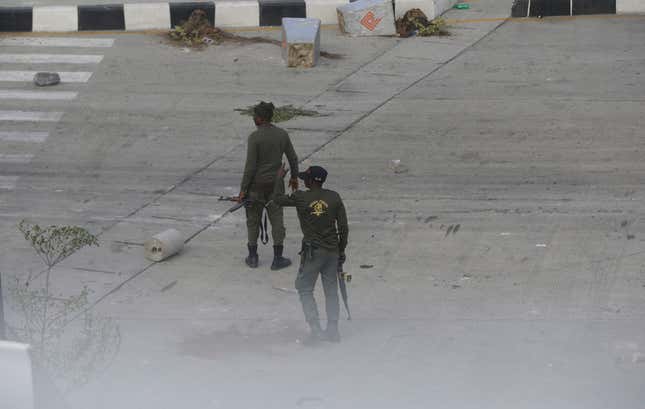
Despite a 24-hour curfew imposed by the government, hundreds of young Nigerians gathered in Lagos Tuesday afternoon to continue protesting against police violence in the country. As they had been doing for weeks, they waved Nigerian flags, danced to Afrobeats and carried signs with the slogan “#EndSARSNow.”
The Nigerian military threatened last week to take action against “troublemakers” at protests—a warning believed by demonstrators to be targeted at them, though they had more frequently been the target of violence. Still, organizers believed that if they demonstrated nonviolently, they could avoid being attacked. One video showed an organizer advising protesters to sit down as uniformed men with guns approached a crowd in Lekki, a suburb of Lagos, the country’s largest city.
Just after 7 pm, as the uniformed men surrounded the crowd, the street lights suddenly went dark. In the darkness, gunfire rang out, followed by screams.
The numbers of the dead are still unclear, with the Nigerian government saying little about the coordinated action taken against protesters or the fatalities and injuries that occurred as a result. Videos taken at the protests, as well as information pouring in through various grassroots organizations are helping many in Nigeria and across the world understand exactly what happened on Tuesday night.
Several are believed to be dead and dozens wounded at last night’s demonstrations. One anonymous person who was at the Lekki toll plaza told the Washington Post there was no warning before police began firing upon protesters; at least four people around him had died. Another unnamed witness told BBC News that soldiers fired directly at protesters. “They were firing and they were advancing straight at us. It was chaos. Somebody got hit straight beside me and he died on the spot,” he said.
Witnesses speaking to the Nigerian newspaper, The Premium Times reported about a dozen dead.
Lagos State Governor Babajide Sanwo-Olu gave a stunningly passive statement Tuesday night, blaming the shooting of protesters on “forces beyond his control,” the Premium Times reported.
“This is the toughest night of our lives as forces beyond our direct control have moved to make dark notes in our history, but we will face it and come out stronger,” Sanwo-Olu said.
In a statement Wednesday, Nigerian President Muhammadu Buhari did not refer to the shootings Tuesday night, calling on Nigerians to be patient as police reforms “gather pace.” Meanwhile, the army, which on Oct. 14 warned “all subversive elements” that it would “defend the country and her democracy at all cost” called media reports of the violence in Lekki “fake news.”
Curfews have been imposed beyond Lagos to other Nigerian cities.
The protests against police brutality in Nigeria have many parallels to demonstrations happening in the United States and elsewhere around the world, with young Nigerians calling for greater government accountability for years of corruption, poor governance and a lack of oversight and responsibility for systemic state violence. The movement in Nigeria, Africa’s wealthiest and most populous nation, is a decentralized one, with multiple grassroots organizations working to disseminate information, coordinate protests and raise funds.
The protests have primarily concentrated on the Special Anti-Robbery Squad (SARS) unit, which has long been accused of heinous crimes against young Nigerians, including extortion, unlawful detainment and extrajudicial killings.
Sources talking to the BBC reported never seeing their loved ones again after encounters with SARS officers.
Last week, President Buhari agreed to dissolve SARS but said it would be replaced by a new unit, the Special Weapons and Tactics (SWAT) team. But protesters have largely rejected the reform, calling for more substantial changes to the country’s policing. As Time reports, there are five core demands circulating from organizers seeking reforms, including the immediate release of all arrested protesters, justice for all deceased victims of police brutality and additional compensation for their families, an independent oversight body that would investigate and prosecute all reports of police misconduct within 10 days and a requirement that all SARS officers undergo psychological evaluation and re-training by an independent organization before working with other units.
In response to the military crackdown on Tuesday night, Democratic presidential candidate Joe Biden called on Nigerian officials to cease the violence against protesters, writing, “the U.S. must stand with Nigerians who are peacefully demonstrating for police reform and seeking an end to corruption in their democracy.”
Celebrities like Rihanna and Nigerian soccer star Odion Jude Ighalo, who plays for Manchester United, also amplified the #EndSARS movement.
“I’m ashamed of this government,” Ighalo said in an online video, pleading with Nigerians to “remain safe, be indoors. Please don’t come out because this government, they [will] kill us, and they will keep killing if the world do not talk about this.”
Among the organizations raising funds for protesters are American groups like Abolitionists @ Northwestern University, who are raising funds for temporary safehouses for queer protesters in Nigeria, and a number of Nigerian organizations, among them the Nigerian feminist group Feminist Coalition, which is accepting donations in bitcoin.
In New York City, a “March for Nigerian Lives” organized by #EndSARSNYC is being planned for 2 pm ET.

